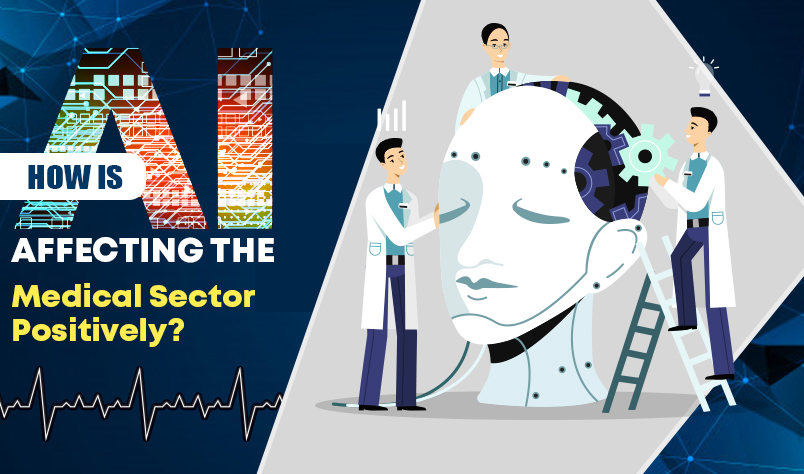-
Get Cloud GPU Server - Register Now!
Toggle navigation

There is no space for carelessness in the healthcare sector, especially when the matter is revolving around life and death. In the 21st century, people give their health more priority over hard-earned money, and that’s why they pay a visit to hospitals at regular intervals to ensure everything is fine with their body.
Customarily, a medical facility in the USA is hailed because hospitals over there use state-of-the-art technology to uplift their success rate. When it comes to vanguard technologies, it is nothing less than a crime to forget about artificial intelligence, as this ever-intensifying tech has been acting as a helping hand since its adoption in the medical field.
As per Becker’s Healthcare, applications of artificial intelligence will help, by 2021, the healthcare industry to save $52 billion. In the very same year, the market for AI in healthcare is about to reach $6.6 billion. Another attention-grabbing aspect is that artificial intelligence will help to prevent 57% of different kind of diseases. Now, it should be crystal clear why applications of artificial intelligence are deemed as a helping hand.
Today, we will uncover 4 real-world examples that explain how much AI is required in the health care sector. So, let’s begin:
At the present time, the salience of AI-powered healthcare assistants cannot be ignored because they perfectly take care of common tasks such as communicating with patients about the prescribed medicines, giving reminders about appointments, and so on. By means of virtual health assistants, the medical sector saves around $20 billion annually… Jeez! It’s a huge cost saving.
What’s more, virtual nurses offer 24/7 assistance, which could be handy during medical emergencies. In addition, you don’t have to look somewhere else for a piece of advice regarding common medical conditions or diet plans, as virtual assistants will provide quick answers.
Having a word with virtual health assistants isn’t tough, as you can interact with them in a similar way you do with Siri, Alexa, etc.
The major reason why we are so dependent on today’s technology is it helps to do things without putting much effort. In the healthcare sector, one of the most challenging tasks is performing surgery to perfection because any small mistake could put the patient’s life at jeopardy. Thanks to applications of artificial intelligence, surgeons don’t have to stay under the pump any much longer.
Artificial intelligence saves a whopping $40 billion for medical businesses. From analysing pre-op data to guiding a surgeon, applications of artificial intelligence pre-empt unexpected complications as they promise high levels of precision. This leads to two-fold advantages — ‘High success rate’ ‘Low hospital stay,’ etc.
If industry reports are anything to go by, hospital stays decrease up to 21% owing to artificial intelligence. Due to this, medical businesses enjoy fantastic patient loyalty and buttressed brand image.
Thanks to AI-assisted surgery, patients have to bear minimal incisions. Moreover, AI-powered robots scan data from previously performed operations to develop new surgical techniques. By all means, this stops normal surgery to turn into a complicated one.
There’s one study that has revealed 379 orthopedic patients are gratified with AI-based procedures as they ensure 5 times lesser complications, comparing with traditional surgery techniques. HeartLander is a vivid example of robot-assisted surgery.
In the healthcare sector, radiology is one of those medical techniques that help doctors to know what wrong is going with patients. Radiology means looking into images to find out the medical issue. X-rays, MRIs, ultrasounds, etc. are part of radiology.
Earlier, practitioners had to spend significant time looking at images as well as patients. Now, the table has been turned as applications of artificial intelligence ensure perfect medical imaging diagnostics. AI can scan images 1,000 times faster and generate precise results. To leave nothing to chance, results generated by AI get sent to a doctor for crosschecking purpose.
For radiology purpose, AI is being adopted aggressively by most of the hospitals. For instance, ‘University of Rochester Medical Center’ is using tech from an AI radiology company named as ‘Aidoc’ so that critical cases can be handled on a priority.
Barring radiology, artificial intelligence offers great help during the cardiology process by identifying heart-related issues in the preliminary stages, which as a positive consequence, ensures better treatment for patients.
All in all, artificial intelligence has the potential to secure a bright future for the healthcare industry.
Nowadays, almost every industry is showing great interest in AI, as this tech promises to unlock new possibilities. As we have already seen in the aforementioned pointers, AI is working as a life-changing factor which is making a big positive impact on both doctors and patients’ lives. Owing to its ability to accumulate and analyze a pile of data, AI yields faster and precise diagnosis results.
Due to artificial intelligence, from the business’s perspective, the healthcare sector can save a significant amount of money without compromising with the quality of treatment. Please don’t have any thoughts like — ‘Can AI replace doctors in the future?’ — Because this tech isn’t going to do such thing. On the contrary, an amalgamation of AI and human doctors can possibly secure a bright and healthy future for patients.
Thanks for reading!